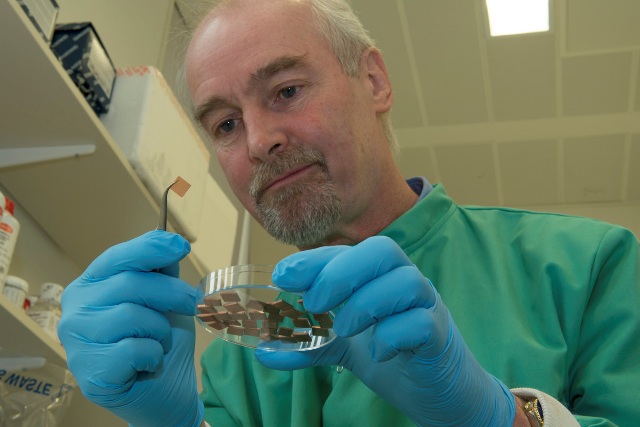University of Southampton researchers have reportedly found strong evidence that antimicrobial copper can help prevent the spread of Ebola. The intrinsic hygiene benefits that materials such as copper provide could enhance the effectiveness of existing protocols such as disinfectants and quarantine procedures, which by themselves are proving insufficient in curbing the spread of the deadly virus.
 Professor Bill Keevil at the University of Southampton
Professor Bill Keevil at the University of Southampton
Clinical trials carried out in the US, UK and Chile have proved that 'antimicrobial copper' surfaces reduce surface contamination by more than 80%. Another German research also studied the effectiveness of copper in killing viral biothreat agents. Moreover, the University of Southampton study illustrates the ability of copper to completely and quickly inactivate norovirus. Results of these studies endorse the potential role of antimicrobial copper surfaces in containing the spread of the Ebola virus.
According to the US Centers for Disease Control and Prevention, the Ebola virus is transmitted via contaminated objects or contact with body fluids of an infected person. Although many surface disinfectants are effective against similar viruses, testing these disinfectants on Ebola has not been possible so far because of lack of proper access to laboratories with the stipulated safety clearances. Hence the CDC has recommended the use of disinfectants effective against norovirus, adenovirus and poliovirus, which are resistant viruses, in hospitals.
Antimicrobial copper surfaces continuously destroy pathogens in between regular cleaning schedules, without the need for manual intervention or other safety measures. Hence they are considered as a 'no touch' solution to disinfection.
Using antimicrobial copper in frequently touched surfaces such as taps, light switches, and door handles will promote better hygiene, which prevents spreading of pathogens. Hence, antimicrobial copper surfaces could be a valuable addition to existing safety protocols to prevent the spread of Ebola.
Based on our research on viruses of similar genetic structure, we expect copper surfaces to inactivate Ebola, and to help control the spread of this virus if employed for publicly-used touch surfaces.
Professor Keevil from the University of Southampton.
References